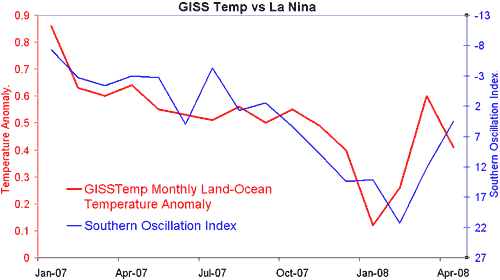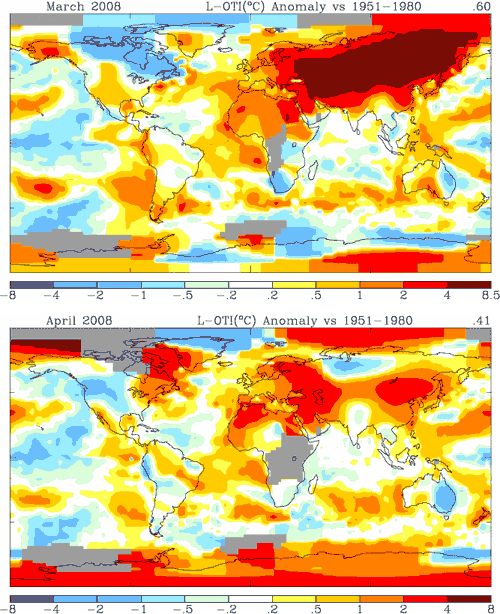April update on global cooling 2008
Posted on 15 May 2008 by John Cook
Simon Donner makes a valid criticism of the climate blog ritual of scrutinising monthly temperature data. If recent events tell us anything, it's not to draw conclusions about long term climate trends based on short term temperature fluctuations. So is it really instructive to scrutinise monthly records and attempt to infer meaning in data dominated by weather noise? Maybe not. But it is fun.
GISSTemp just updated their land-ocean temperature index (a few days later than usual). Figure 1 shows updated global temperature anomaly since January 2007, plotted alongside the Southern Oscillation Index (a measure of ENSO activity).

Figure 1: Global temperature anomaly> (red line - NASA GISS) compared to Southern Oscillation Index (blue line - Australian Bureau of Meteorology). The SOI axis is inverted for readability as high positive SOI values correspond to strong La Nina conditions.
The SOI index continues it's trend from last month so we can say with more confidence that La Nina is subsiding. Also of interest is March 2008 which GISS adjusted from 0.67°C to 0.60°C. The reason for the adjustment is apparent when viewing a global map of March temperature anomaly. Previously, the whole southern half of Africa was missing from the GISS record. Much of that data has been filled in, showing cool conditions.

Figure 2: Map of temperature anomaly for March and April 2008.
April 2008 is lower than March - largely due to dramatic cooling across Russia. Much of the continent suffering unusually hot weather conditions in March. As La Nina continues to decline (and in fact the SOI may even switch to negative conditions next month), I would expect global temperatures to follow.
Of course pesky weather and other factors may come into play. The northern Pacific is cooling with the PDO switching to a cool phase. Plus a volcano erupted in Chile last week. When Mount Pinutabo erupted in 1991, it emitted 20 million tonnes of sulfur dioxide, lowering global temperatures significantly for several years. However, the Chaiten volcano has only emitted an estimated few thousand tons of sulfur dioxide. According to Rutgers University professor and volcano boffin, Alan Robock, "a volcano must spew at least 1 million tons of sulfur dioxide into the stratosphere to have a global effect on climate." It will be interesting to see May's data, particularly the spatial temperature changes around South America. The climate blog ritual rolls on...































 Arguments
Arguments























 0
0  0
0






Comments